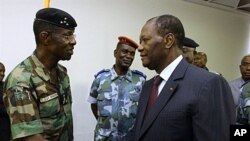The African Union has reinstated Ivory Coast as a member in good standing, lifting the suspension imposed after former president Laurent Gbagbo refused to accept defeat in last November's presidential election. The AU Peace and Security Council also heard a troubling report on political developments in Somalia.
The Peace and Security Council chairman for April, Ambassador Joseph Nsengimana, said all sanctions imposed against Ivory Coast are lifted in view of President Alassane Ouattara’s assumption of power.
"In the communiqué we made on December, 2010, it was said that until the president-elect is not assuming the real power, we decided the suspension of [Ivory Coast]. Now President Ouattara is assuming power so we lifted the suspension," Nsengimana said.
Ivory Coast’s reinstatement means the Peace and Security Council is back to its full strength of 15.
Next focus: Libya, Somalia
Another council member, Libya, will be on the agenda next week, but a council spokesman said there is no move to suspend Libya’s membership. The meeting will hear a status report on efforts to negotiate a political solution to the conflict in Libya.
Participants at Thursday’s session also heard good news and bad news about efforts to establish stability in Somalia after 20 years as a failed state.
Nsengimana, who also is Rwanda’s AU ambassador, said the good news is that pro-government forces have taken firm control of 60% of the Somali capital, Mogadishu. Until recently, government control was limited to a few kilometers around the presidential palace.
Nsengimana said 80% of Mogadishu's population is living in the part of the city secured by the 8,000-person AU peacekeeping force known as AMISOM.
The bad news is that the military gains are being threatened by feuding between the country’s transitional government and parliament, which recently took unilateral action to extend its mandate for three more years. Nsengimana called parliament’s action "regrettable”"
"The situation in Somalia is not good, not at all. On the political side there is no cooperation between the two main institutions, the government and the parliament. We regret that the parliament took a decision to extend its mandate for three years without consulting any other shareholders," said Nsengimana.
Criticism of UN
An AU Commission report presented to Thursday’s meeting criticizes the United Nations for failing to respond to the Council’s request for a no-fly zone and naval blockade on Somalia. The measures would be aimed at preventing foreign fighters and weapons from reaching the al-Qaida-linked rebel group al-Shabab, which continues to control much of southern and central Somalia.
The report expresses grave concern about al-Shabab’s refusal to allow adequate access by humanitarian aid agencies as drought sweeps over the region. An estimated 50,000 people have been displaced since the drought set in last December, and long-range weather forecasts predict lower than normal rains over the next few months.
African Union Reinstates Ivory Coast













